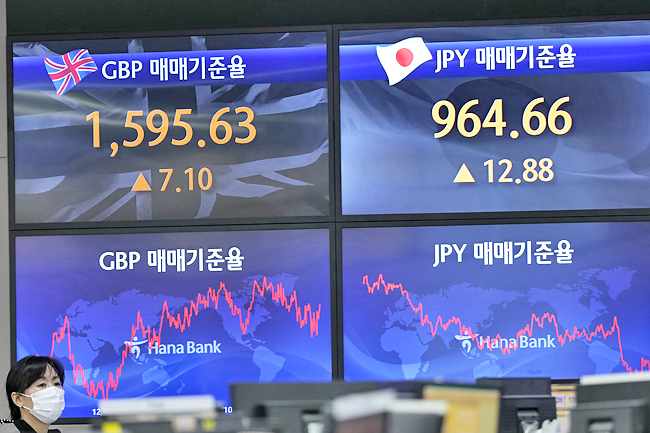Elaine Kurtenbach
BANGKOK (AP) – Shares were higher in Asia yesterday, tracking gains on Wall Street, where the market is headed for its first weekly gain after three weeks of punishing losses.
Tokyo’s Nikkei 225 index added 0.9 per cent to 26,411.64 and the Kospi in Seoul jumped 1.8 per cent to 2,356.38. Hong Kong’s Hang Seng advanced 1.4 per cent to 21,567.30 and the Shanghai Composite index added 0.4 per cent to 3,334.67.
In Australia, the S&P/ASX 200 gained 0.2 per cent to 6,539.10. Shares also rose in India and Taiwan. Market players are looking ahead to United States (US) inflation data due next week.
They appeared to shrug off preliminary data showing a moderation in activity in several countries including Japan.
A report yesterday showed inflation in Japan remained at 2.1 per cent in May, pushed higher by energy costs and a weaker currency. However, underlying core inflation, which excludes volatile costs for energy and fresh foods, remained at 0.8 per cent and the central bank is unlikely to follow the example of the US Federal Reserve and other central banks in raising interest rates, analysts said.
The Bank of Japan “isn’t convinced that this will be sustainable because wage growth remains soft and higher energy costs are weighing on corporate profits and consumer sentiment,” Marcel Thieliant of Capital Economics said in a commentary. On Wall Street, trading was wobbly as investors focussed on another round of testimony before Congress by Federal Reserve Chair Jerome Powell. He told a House committee the Fed hopes to rein in the worst inflation in four decades without knocking the economy into a recession, but acknowledged “that path has gotten more and more challenging”.
The S&P 500 ended one per cent higher at 3,795.73 after having been down as much as 0.4 per cent. The Dow Jones Industrial Average rose 0.6 per cent to 30,677.36 and the Nasdaq gained 1.6 per cent to 11,232.19.

Smaller company stocks also gained ground. The Russell 2000 rose 1.3 per cent to 1,711.67.
Trading has been turbulent in recent weeks as investors try to determine whether a recession is looming. The benchmark S&P 500 is currently in a bear market. That means it has dropped more than 20 per cent from its most recent high, which was in January. The index has fallen for 10 of the last 11 weeks.
On Thursday, Powell stressed, “I don’t think that a recession is inevitable”. He has said it’s ”certainly a possibility” and that the central bank is facing a more challenging task amid the war in Ukraine essentially pushing oil and other commodity prices even higher and making inflation even more pervasive.
Powell spoke to Congress a week after the Fed raised its benchmark interest rate by three quarters of a percentage point, its biggest hike in nearly three decades. Fed policymakers also forecast a more accelerated pace of rate hikes this year and next than they had predicted three months ago, with its key rate to reach 3.8 per cent by the end of 2023. That would be its highest level in 15 years.
The Labor Department reported on Thursday that fewer Americans applied for jobless benefits last week, though it was slightly more than economists expected. The solid job market is a relatively bright point in an otherwise weakening economy, with consumer sentiment and retail sales showing increasing damage from inflation.
As higher prices stretch pocketbooks, consumers are shifting spending from big ticket items like electronics to necessities. The pressure has been worsened by record-high gasoline prices that show no sign of abating.
Big technology and health care companies did much of the heavy lifting. Microsoft rose 2.3 per cent and Johnson & Johnson rose 2.2 per cent.
Energy stocks fell as the price of US crude oil dropped 1.8 per cent. Valero fell 7.6 per cent.
Yesterday, US benchmark crude oil was up one cent at USD104.28 per barrel in electronic trading on the New York Mercantile Exchange. Brent crude, the basis for pricing for international trading, shed 34 cents to USD106.12 per barrel.
Bond yields fell significantly. The yield on the 10-year Treasury note, which helps set mortgage rates, fell to 3.09 per cent from 3.15 per cent late Wednesday.
The US dollar fell to JPY134.73 from JPY134.94. The euro rose to USD1.0535 from USD1.0524.



















































